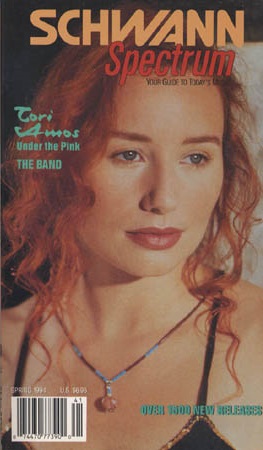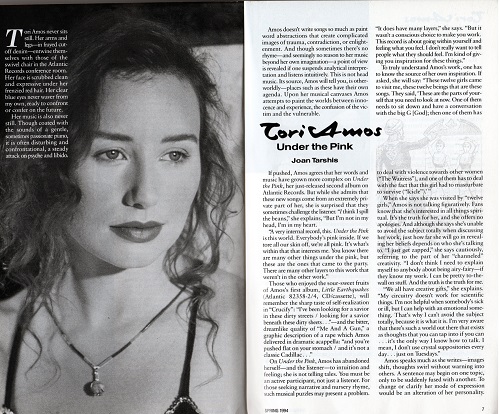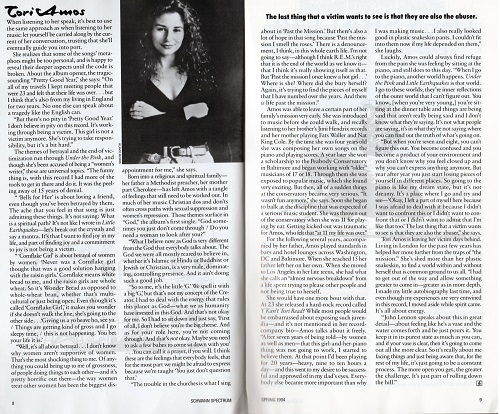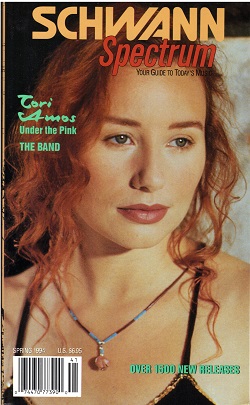|

songs | interviews | photos | tours | boots | press releases | timeline
Schwann Spectrum (US)
Spring 1994

Tori Amos
Under The Pink
by Joan Tarshis
Tori Amos never sits still. Her arms and legs - in frayed cut-off denim
- entwine themselves with those of the swivel chair in the Atlantic
Records conference room. Her face is scrubbed clean and expressive under
her frenzied red hair. her clear blue eyes never waver from my own,
ready to confront or confer on the future.
Her music is also never still. Though coated with the sounds of a
gentle, sometimes passionate piano, it is often disturbing and
confrontational, a steady attack on psyche and libido.
Amos doesn't write songs so much as paint word abstractions that create
complicated images of trauma, contradiction, or enlightenment. And
though sometimes there's no thyme - and seemingly no reason to her music
beyond her own imagination - a point of view is revealed if one suspends
analytical interpretation and listens intuitively. This is not head
music. Its source, Amos will tell you, is other-worldly - places such as
these have their own agenda. Upon her musical canvases Amos attempts to
paint the worlds between innocence and experience, the confusion of the
victim and the vulnerable.
If pushed, Amos agrees that her words and music have grown more complex
on Under The Pink, her just-released second album on Atlantic Records.
But while she admits that these new songs come from an extremely
private part of her, she is surprised that they sometimes challenge the
listener. "I think I spill the beans," she explains, "But I'm not in my
head, I'm in my heart."
"A very internal record, this. Under the Pink is this world. Everybody's
pink inside. If we tore all our skin off, we're all pink. It's what's
within that that interests me. You know there are many other things
under the pink, but these are the ones that came to the party. There are
many other layers to this work that weren't in the other work."
Those who enjoyed the sour-sweet fruits of Amos's first album, Little
Earthquakes (Atlantic 82358-2/4, CD/cassette), will remember the sharp
taste of self-realization in Crucify: "I've been looking for a savior in
these dirty streets/looking for a savior beneath these dirty sheets..."
- and the bitter, dreamlike quality of Me And A Gun, a graphic
description of a rape which Amos delivered in dramatic acapella:"and
you're pushed flat on your stomach/ and it's not a classic Cadillac..."
On Under the Pink, Amos has abandoned herself - and the listener - to
intuition and feeling; she is not telling tales. you must be an active
participant, not just a listener. For those seeking narrative and
nursery rhyme, such musical puzzles may present a problem. "It does have
many layers," she says. "But it wasn't a conscious choice to make you
work. This record is about going within yourself and feeling what you
feel. I don't really want to tell people what they should feel. I'm kind
of giving you inspiration for these things."
To truly understand Amos's work, one has to know the source of her own
inspiration. if asked, she will say:"These twelve girls came to visit
me, these twelve beings that are these songs. They said, 'These are the
parts of yourself that you need to look at now. One of them needs to sit
down and have a conversation with the big G [God]; then one of them has
to deal with violence towards other women (The Waitress), and one of
them has to deal with the fact that this girl had to masturbate to
survive (Icicle).'"
When she says she was visited by "twelve girls," Amos is not talking
figuratively. Fans know that she's interested in all things spiritual.
it's the truth for her, and she offers no apologies. And although she
says she's unable to avoid the subject totally when discussing her work,
just how far she will go in revealing her beliefs depends on who she's
talking to. "I just get zapped," she says cautiously, referring to the
part of her "channeled" creativity. "I don't think I need to explain
myself to anybody about being airy-fairy - if they know my work. I can
be pretty to-the-wall on stuff. And the truth is the truth for me.
"We all have creative gifts," she explains. "My circuitry doesn't work
for scientific thing. I'm not helpful when somebody's sick or ill, but I
can help with an emotional something. That's why I can't avoid the
subject totally, because it is what it is. I'm very aware that there's
such a world out there that exists as thoughts that you can tap into if
you can... it's the only way I know how to talk. I mean, I don't use
crystal suppositories every day... just on Tuesdays."
Amos speaks much as she writes - images shift, thoughts swirl without
warning into others. A sentence may begin one one topic, only to be
suddenly fused with another. To change or clarify her mode of expression
would be an alteration of her personality. When listening to her speak,
it's best to use the same approach as when listening to her music: let
yourself be carried along by the current of her conversation, trusting
that she'll eventually guide you into port.
She realizes that some of the songs' metaphors might be too personal,
and is happy to reveal their deeper aspects until the code is broken.
About the album opener, the tragic-sounding, Pretty Good Year, she says:
"On all of my travels I kept meeting people that were 23 and felt that
their life was over... but I think that's also from my living in England
for two years. No one else can speak about a tragedy like the English
can."
"But there's no pity in Pretty Good Year. I don't believe in pity on
this record. It's working through being a victim. This girl is not a
victim anymore. She's trying to take responsibility, but it's a bit
hard."
The themes of betrayal and the end of victimization run through Under
the Pink, and though she's been accused of being a "women's writer,"
these are universal topics. "The funny thing is , with this record I had
more of the tools to get in there and do it. It was the peeling away of
15 years of denial."
"Bells For Her is about loving a friend, even though you've been
betrayed by them. The ache that you feel in that song is just admitting
these things. It's not saying: What is a spiritual path? It's not like I
wrote in Little Earthquakes - let's break out the crystals and say a
mantra. It's that I want to find joy in my life, and part of finding you
and a commitment of joy is not being a victim."
"Cornflake Girl is about betrayal of women by women. 'Never was a
Cornflake girl, thought that was a good solution, hanging with the raisin
girls.' Cornflake means white bread to me, and the raisin girls are
whole wheat. So it's Wonder Bread as opposed to whole-wheat bran,
whether that's multi-cultural or just being open. Even though its's
called Cornflake Girl, it makes you wonder if she doesn't walk the line,
she's going to the other side... 'Giving us a yo heave ho, see ya/Things
are getting kind of gross and I go sleepy time/this is not happening.
You bet your life it is.'"
"Well, it's all about betrayal... I don't know why women aren't
supportive of women. That's the most shocking thing to me. Of anything
you could bring up to me of grossness, of people doing things to each
other - and its pretty horrific out there - the way women treat other
women has been the biggest disappointment for me," she says.
Born into a religious and spiritual family - her father a Methodist
preacher, her mother part Cherokee - has left Amos with a tangle of
feelings that still need to be worked out. In much of her music
Christian dos and dont's often cross paths with sexual suppression and
women's repression. Those themes surface in God, the album's first
single. "God sometimes you just don't come through/Do you need a woman
to look after you?"
"What I believe now as God is very different from the God that everybody
talks about. The God we were all mostly reared to believe in, whether
it's Islamic or Hindu or Buddhist or Jewish or Christian, is a very
male, dominating, controlling presence. And it ain't doing such a good
job.
"So to me, it's the little 'g'. We spell it with a big 'G', but that's
not my concept of the Creator. I had to deal with the energy that rules
this planet as God - what we as humanity have invested in this God. And
that's not okay for me. So I had to sit down and just say, 'First of
all, I don't believe you're the big cheese. And as for your role here,
you're not coming through. And that's not okay. Maybe you need to ask a
few babes to come sit down with you'... You can call it a prayer, if you
will. I think thse are the feelings that everybody feels, that for the
most part we might be afraid to express because we're taught 'You just
don't question that'"
"The trouble in the churches is what I sing about in Past The Mission.
But there's also a lot of hope in that song because 'Past the mission I
smell the roses.' There is a denouncement, I think, in this whole earth
life. I'm not going to say - although I think R.E.M.'s right that it is
the end of the world as we know it - that I think it's really showing
itself as that. But 'Past the mission I once knew a hot girl...' Where
is she? Where did she bury herself? Again, it's trying to find the
pieces of myself that I have numbed over the years. And there is life
past the mission."
Amos was able to leave a certain part of her family's mission very
early. She was introduced to music before she could walk, and recalls
listening to her brother's Jimi Hendrix records and her mother playing
Fats Waller and Nat King Cole. By the time she was four years old she
was composing her own songs on the piano and playing scores. A year
later she won a scholarship to the Peabody Conservatory in Baltimore and
began working with "older" musicians of 17 or 18. Through them she was
exposed to popular music, which she found very exciting. But then, all
of a sudden things at the conservatory became very serious. "It wasn't
fun anymore," she says. Soon she began to balk at the discipline that
was expected of a serious music student. She was thrown out of the
conservatory when she was 11 for playing by ear. Getting kicked out was
traumatic for Amos, who felt that "at 11 my life was over."
For the following several years, accompanied by her father, Amos played
standards in bars and hotel lounges across Washington, DC and Baltimore.
When she reached 15 her father left her on her own. When she moved to
Los Angeles in her late teens, she had what she calls an "almost nervous
breakdown" from a life spent trying to please other people and not being
true to herself.
She would have one more bout with that. At 23 she released a hard-rock
record called Y Kan't Tori Read? While most people would be embarrassed
about exposing such juvenilia - and it's not mentioned in her
record-company bio - Amos talks about it freely. "After seven years of
being told - by women as well as men - that this girl-and-her-piano
thing was not going to work, I started to believe them. At that point
I'd been playing for 20 years - heavy, nine to ten hours a day - and
this went to my desire to be successful and approved of in my dad's
eyes. Everybody else became more important than why I was making
music... I also really looked good in plastic snakeskin pants. I
couldn't fit into them now if my life depended on them," she laughs.
Luckily, Amos could always find refuge from the pain she was feeling by
sitting at the piano, and still does to this day. "When I go to the
piano, another world happens. Under The Pink and Little Earthquakes is
that world. I go to these worlds; they're inner reflections of the
outer world that I can't figure out. You know, [when you're very young,]
you're sitting at the dinner table and things are being said that aren't
really being said and I don't know what they're saying. It's not what
people are saying, it's in what they're not saying where you can find
out the truth of what's going on.
"But when you're seven and eight, you can't figure this out. You become
confused and you become a product of your environment and you don't know
why you feel closed up and why you can't express anything anymore. But
year after year you just start losing pieces of yourself in different
places. So going to the piano is like my dream state, but it's not
dreamy. It's a place where I go and try and see - 'Okay, I left a part
of myself here because I was afraid to deal with it because I didn't
want to confront this or I didn't want to confront that or I didn't want
to admit that I'm like that too.' The last thing that a victim wants to
see is that they are also the abuser," she says.
Tori Amos is leaving her victim days behind. Living in London for the
past few years has helped her move further fro the traps of "the
mission." She's shed more than her plastic snakeskin, to find a world
within and without herself that is common ground to us all. "I had to
get out of the way and allow something greater to come in - greater as in
more depth. I made my little autobiography last time, and even though my
experiences are very entwined in this record, I moved aside while spirit
came. it's all about energy."
"John Lennon speaks about this in great detail - about feeling like he's
a vase and the water comes forth and he just pours it. You keep it in
its purest state as much as you can, and if your vase is clear, then
it's going to come out all the more clear. So it's really about me
facing things and just being aware that, for the rest of my life, it's
just going to be a constant process. The more open you get, the greater
the challenge. It's just part of rolling down the hill."
original article



[scans by Sakre Heinze]
t o r i p h o r i a
tori amos digital archive
yessaid.com
|